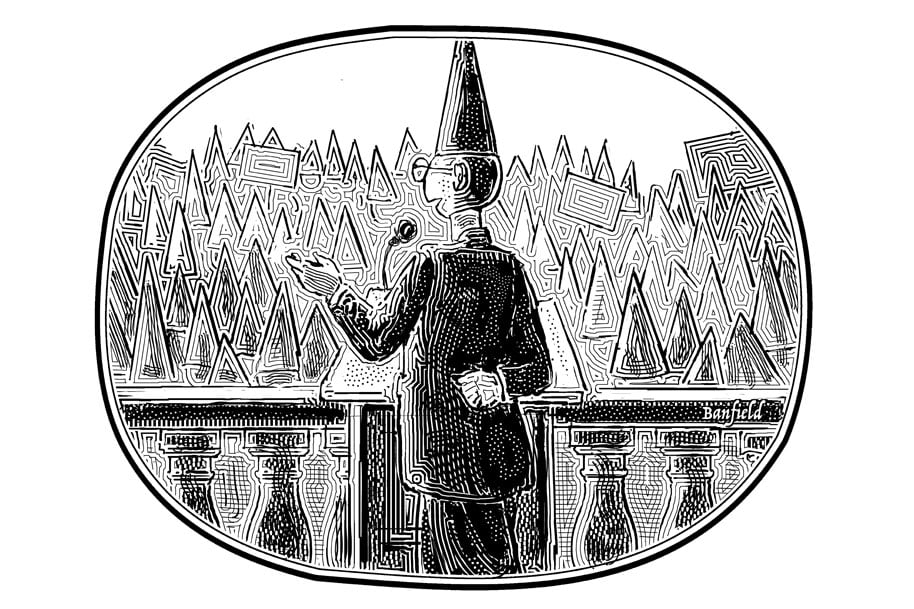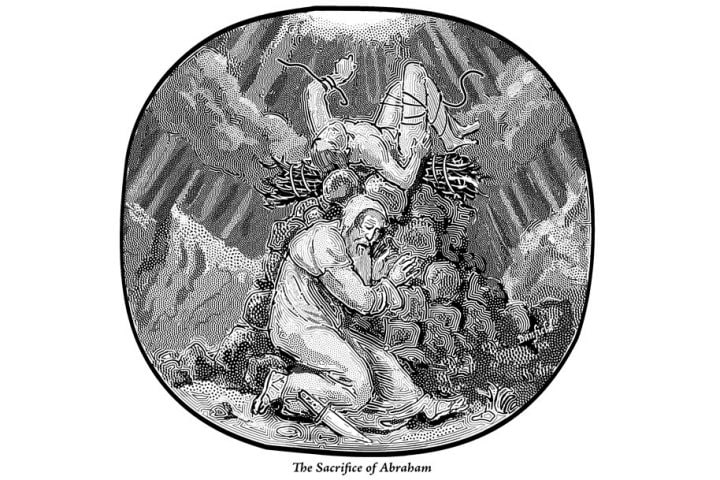Books Reviewed
In October 2019, a British court ruled that Dr. David Mackereth could be fired from his job as a healthcare provider because he believed that “God created mankind in His image—male and female.” Dr. Mackereth was unwilling to agree that a man may meaningfully claim to be a woman. The court therefore decided that “belief in Genesis 1:27…and conscientious objection to transgenderism…are incompatible with human dignity.”
“Identity politics” has come to mean the endless fomenting of racial animus, vilification of all things male, and insistence that sexually eccentric people of all kinds be not only tolerated but idolized. Its polymorphic grievances and calls for retribution have reached a pitch of ferocity and illogic that would drive any thinking person to distraction. Calling the imago Dei incompatible with human dignity is akin to insisting that seeds are incompatible with flowers, or grain with bread. When some people can ruin others’ lives over such nonsense, it’s difficult not to respond with inchoate rage.
Refreshingly, however, Douglas Murray is not inchoate in The Madness of Crowds. Instead, he is measured and lucid. Murray, an associate editor of the Spectator, is known both in his native England and overseas for icily eloquent articulations of hard truths. His previous book, The Strange Death of Europe (2017), stayed on Britain’s Sunday Times bestseller list for 20 weeks because it so clearly excoriated Europe’s ruling classes for immigration policies that became a terrifying fiasco.
* * *
With equally surgical precision, The Madness of Crowds exposes the contradictions underlying many of our present social dogmas—e.g., the competing ideas that gender is a figment of our collective imagination, and yet a biological male can be spiritually female on some ineradicably essential level. One of Murray’s central themes is the frantic speed with which such dogmas have become axiomatic despite, or perhaps because, they have yet to be logically defended in a serious way. We are being held hostage to “[n]orms that are meant to be universal” but “weren’t followed until the day before yesterday.” These norms, enforced on pain of social ostracization and unemployment, “grind hideously and noisily both against each other and within themselves.”
Rationally argued though it is, the book does not spare us gruesome anecdotes about progressivism’s excesses. In particularly painful detail, Murray describes the hideous rush to pump children full of hormones and operate on them the minute they express even a passing confusion about their gender. His treatment of this tragic subject is both heartrending and volcanic in its indignation: “Are people like blocks of Lego onto which new pieces can be stuck, taken off and replaced again at will?”
Throughout, Murray’s one-liners leaven the otherwise unbearable horror of such practices. “Prose this bad can only occur when the author is trying to hide something,” he says of academics like Judith Butler of U.C. Berkeley, who likes to lay down intellectual covering fire for gender extremists. Noting that activist organizations such as Black Students United seek to redress racism against black people with racism against white people, Murray asks, “And what might be the negative consequences of such a posture?” Wit of the right sort is a powerful answer to absurdity, and one of Murray’s greatest virtues as a stylist.
* * *
The Madness of Crowds consists of four long chapters—one each on homosexuality, gender, race, and transgenderism—separated by short interludes on such topics as the Marxist underpinnings of grievance theory. Murray approves of petitions for legal equality made successfully in the past by women, homosexuals, blacks, and intersex persons. He’s genuinely disappointed in the fierce radicalization of these movements, which “started as legitimate human rights campaigns.” His conviction is that behind all such crusades there once lay a sincere impulse to redress real structural injustices in American and European society.
That conviction underlies his account of how identity politics came to be the menace it is today. At the end of the 1900s, the fights for women’s rights and gay rights “appeared to be arriving at some sort of settlement,” he argues. “Then just as the train appeared to be reaching its desired destination it suddenly picked up steam and went crashing off down the tracks and into the distance.” Murray cites conservative philosopher Kenneth Minogue, who observed and named a pattern of behavior called “‘St. George in retirement’ syndrome.” Minogue imagined that George, having slain an actual dragon, would find that his reason for being had evaporated. “[A]fter tiring himself out in pursuit of ever-smaller dragons,” Murray explains, “[St. George] may eventually even be found swinging his sword at thin air, imagining it to contain dragons.” So it is with today’s would-be heroes: looking around at a world in which most of the major battles have been won—where women’s suffrage and gay marriage are the laws of the land—identitarians are forced to seek purpose in newly invented crises.
The fruit of such sociological thrill-seeking is a series of ever-more passionate crusades to achieve ever-more bizarre objectives, such as securing a boy’s “right” to use girls’ bathrooms, or “decolonizing astrology.” (Since The Madness of Crowds was published, astrology’s notionally inherent racism has become a hot topic among Twitter’s aspiring St. Georges.) In support of Murray’s argument, one might add that many currently active Social Justice Warriors came of age after the truly foundational battles had been won. A progressive college student in 2020 grew up hearing glorious tales of the March on Washington, Berkeley free speech movement, and Stonewall riot. What is that student to do if, surveying the political landscape of his day, he discerns no opportunities analogous to those in his forebears’ legends? When the demand for social injustices to conquer exceeds the supply, today’s campus warrior must fabricate new ones.
* * *
A necessary premise of Murray’s St.-George-in-retirement narrative is that progressive social campaigns began with legitimate, laudable methods and aims. On this point The Madness of Crowds invites further reflection and may prompt objections from some readers. Murray does not specify exactly which progressive accomplishments can be considered virtuous, and which outlandish. He assumes, moreover, that the outlandish ones resulted from a warped misunderstanding of the relevant movements’ initial projects. But conservatives of a certain stripe may be more inclined to think that those movements were predicated on a philosophy that, though it accomplished some laudable things at first, could not help but veer eventually into fanaticism.
Reading Murray’s book, one can surmise how he might respond to these points of contention. He writes, for instance, that “[a]lmost nobody could doubt” the rightness and necessity of women’s involvement in the financial sector. To generalize from such observations, those changes that maximized the autonomy of the individual to pursue his greatest happiness, but did not interfere with that pursuit on the part of his neighbor, were valid and good. These include: enfranchising women in all areas of society; decriminalizing consensual sexual acts, including homosexual ones; accommodating individuals suffering gender confusion; and robust color-blindness in all legal systems. All are well-made advances in the modern West.
That is a respectable approach to the matter, but not the only possible one. Indeed, many conservatives in America seriously question whether even the best reforms of the past 100 years were intellectually coherent or constitutionally sustainable. Does the “madness” Murray decries betray the reform movements’ original laudable purposes…or fulfill them? Christopher Caldwell voices this worry about the civil rights era in his new book, The Age of Entitlement. Similar discomforts have motivated widespread objection to the Supreme Court’s 2015 decision in Obergefell v. Hodges, which legalized gay marriage nationally: even conservatives who approve of gay partnerships are appalled at the ruling’s judicial overreach and its implied threat to religious liberty.
For others, the unease runs even deeper. Many devout Christians would see gay marriage, even if legitimately legalized by Congress, as a threat to the divinely ordained pairing of man and woman which undergirds all good political order. If they are right, then the persecution of David Mackereth and the anathematization of Genesis 1:27 are necessary consequences, not unfortunate perversions, of the push for LGBTQ rights. For traditionalists, contra Murray, that push was never a commendable advancement of Western civilization but always an existential threat to it.
* * *
The Madness of Crowds succeeds admirably as a cogent deconstruction of modern identity politics and a fearless repudiation of leftist doctrine. That is much more than enough for one book. Readers will emerge with a sharpened understanding of the errors that plague our present moment.
What they will not get is a fully decisive treatment of how those errors emerged or—crucially—how we can correct them in the future. Murray does promise to indicate “a number of ways out” of our current predicament. But these are relegated to his brief conclusion, which mostly reiterates his various counterarguments against the prevailing cultural orthodoxy.
They are valid arguments. But, as antidotes to wokeness, they fall short. Defeating identity politics will take more than a series of skillful ripostes, elegantly phrased and deliciously satisfying though they may be. What is needed is not just a critique but a creed: a vision of the good life more compelling than the fanatical march toward a virtuous future that the Left promises.
Formulating such a vision will mean asking some inescapable but unsettling questions. Over the past century, women have entered the workplace in large numbers, contraception has been made widely available, and homosexual relationships have become largely acceptable in the public eye. Traditional, teleological morality as it has historically been understood cannot easily condone these drastic changes. Do conservatives therefore propose to reverse them entirely? Or do we see justice in some of them and wish to accept them, albeit with qualifications? Are there modern elaborations of the old moral consensus that can incorporate some of our new social realities into an updated, but still consistent, account of natural law and the common good?
Simply put, we need to know what we’re arguing for, not just against. Douglas Murray has brilliantly described the symptoms of madness. But conservatives must go further: we must furnish a diagnosis, and a cure.




